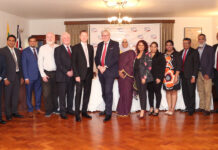
For the seventh consecutive year, IFC partnered with the Colombo Stock Exchange (CSE) to ‘Ring the Bell for Gender Equality’. Celebrated in line with the International Women’s Day, the annual global initiative highlights how greater participation of women in the economy can spur sustainable and inclusive growth, shaping a more equal future.
IFC’s commitment to the initiative is part of its strong focus on gender equality, which includes leveraging relationships with financial institutions to expand access to finance for female entrepreneurs and increase the number of women in leadership roles.
“The Colombo Stock Exchange (CSE) joined this initiative in 2016 as one of the initial stock exchanges, and we believe this is the platform to convene business leaders, investors, and other key parties at the national level to highlight the growing business and economic case for gender equality,” said Dumith Fernando, Chairman of the CSE.
“We at the CSE are encouraged to note that more of our listed companies have welcomed the participation of strong, independent women on their boards. This is evident by a steady increase over the years in the number of listed companies with women holding corporate board seats. There are 96 new board positions that have been occupied by women since 2018. Even though we see a positive trend, we are still short of the regional markets. So, all of us, as policymakers in our respective corporates, are vested with the duty to encourage gender equality in our establishments,” he also said.
In Sri Lanka, the female labor force participation rate remains stagnate at around 35 percent, compared with a steady male participation rate of 74 percent. Similarly, the average female unemployment rate (7 percent) remained more than double that of men (3 percent) between 2011 and 2019. By improving female labor participation, McKinsey Global Institute estimates, Sri Lanka can potentially add $20 billion a year to its gross domestic product (GDP) by 2025 — increasing economic growth by about 14 percent.
Accelerating the pace of gender parity could generate financial returns in the private sector, leading to significant economic, environmental, social, and governance gains in emerging markets.
“Pushing for gender equality today is needed for a sustainable tomorrow. Research – including IFC’s – continues to demonstrate that gender diversity in the boardroom boosts financial performance, promotes better decision-making processes and improved environment, social and governance (ESG) practices,” said Lisa Kaestner, Country Manager for IFC Sri Lanka and Maldives.
“We need more women business leaders for an inclusive and resilient recovery in the country. I hope that companies and policy makers continue to commit toward accelerating the progress made to date,” Lisa Kaestner also said.
According to IFC research – under the IFC-DFAT Women in Work program – the number of women on CSE-listed boards increased from 8.2 percent in 2018 to 10.1 percent in 2022 (from 144 to 240). However, this remains well below the global average of 20 percent.
Among the top 30 CSE-listed companies – as highlighted by IFC report ‘Realizing Sustainability through Diversity: The Case for Gender Diversity Among Sri Lanka’s Business Leadership’ – the correlation between increased board diversity and financial performance is clear, with positive trends being reported in line with indicators such as return on total assets and price-to-earnings ratio.
IFC’s ‘Women on Boards’ program in Sri Lanka is part of the broader efforts to increase women’s private sector participation and leadership by promoting the adoption of corporate governance practices among Sri Lankan companies. IFC’s work in this area is supported by the government of Australia under the IFC-DFAT Women in Work program.
“The Women in Work partnership is integral to the Australian government’s commitment towards advancing opportunities for women and boost economic growth in Sri Lanka. It is based on global evidence that greater diversity is good for business and the economy,” said David Holly, the Australian High Commissioner for Sri Lanka.
At an event to mark International Women’s Day, there was a panel discussion on the business case for gender diversity on boards. Participants included Anoji De Silva, Partner Ernst & Young, Krishan Balendra, Chairman, John Keells Holdings PLC, and Rasakantha Rasiah, Chairman, Hela Clothing. The discussion was moderated by Sarah Twigg, Program Manager for IFC-DFAT Women in Work program.
IFC has long been engaged in efforts at the capital markets level to support women as economic actors. This work includes women in leadership capacity building, support to regulators on integrating gender indicators into corporate governance codes, and co-sponsoring annual Ring the Bell for Gender Equality activities in conjunction with International Women’s Day. This year, a record 120 exchanges are participating in these events worldwide, from less than 10 exchanges in 2015.
IFC – a member of the World Bank Group – is the largest global development institution focused on the private sector in emerging markets. We work in more than 100 countries, using our capital, expertise, and influence to create markets and opportunities in developing countries. In fiscal year 2021, IFC committed a record $31.5 billion to private companies and financial institutions in developing countries, leveraging the power of the private sector to end extreme poverty and boost shared prosperity as economies grapple with the impacts of the COVID-19 pandemic.
For more information, visit www.ifc.org.











